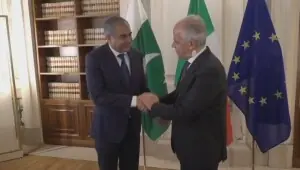Pakistan is looking for external financing avenues, says finance minister
4 min readPakistan will focus on meeting its external financing needs by speaking with foreign governments and lenders to draw foreign investment as well as seeking loan rollovers, Finance Minister Muhammad Aurangzeb told Reuters on Friday, as his government prepares to execute its new $7 billion International Monetary Fund agreement.
Pakistan and the IMF reached an agreement for the 37-month loan program this month. Tough measures such as raising taxes on agricultural incomes and lifting electricity prices have prompted concerns about poor and middle class Pakistanis grappling with rising inflation and the prospect of higher taxes.
Pakistan has relied heavily on IMF programmes for years, at times nearing the brink of sovereign default and having to turn to countries such as the United Arab Emirates and Saudi Arabia to provide it with financing to meet external financing targets set by the IMF.
Finance Minister Muhammad Aurangzeb said in an interview that external financing continued to be an important component, though the government was seeking to focus on more sustainable forms such as direct investment and climate financing.
“I think in the existing situation we can expect those (loan) rollovers to continue to take place … we have requested extension of maturities,” Aurangzeb said.
Rollovers or disbursements on loans from Pakistan’s long-time allies Saudi Arabia, the United Arab Emirates and China, in addition to financing from the IMF, have helped Pakistan meet its external financing needs in the past.
The IMF said the new Extended Fund Facility program is subject to approval from its Executive Board and obtaining “timely confirmation of necessary financing assurances from Pakistan’s development and bilateral partners”.
Aurangzeb said that meeting the external financing gap was “very manageable and very doable”.
He said Pakistan plans to expand its strategy beyond relying heavily on rollovers and toward foreign direct investment, including in the huge copper and gold Reko Diq mine in Balochistan. He added his government was working on identifying “bankable and investable” projects for Saudi Arabia and the United Arab Emirates, which have announced interest in billions of dollars in investment in Pakistan.
“That is what’s going to lead to sustainability, “ he said. “If we can’t get this executed in the next three years, we will not be able to get out of the ‘last’ program.”
Pakistan has been plagued by boom-and-bust cycles for decades, leading to more than 20 IMF bailouts since 1958. It is currently the IMF’s fifth-largest debtor, owing $6.28 billion as of July 11 according to IMF data.
Aurangzeb said the Reko Diq copper and gold mine project had drawn interest from the World Bank’s private investment arm, the International Finance Corporation(IFC), which had signaled it would invest a “large amount”.
Aurangzeb said that during a trip to China that he plans by the end of July, Islamabad will discuss power sector structural reforms with Beijing that have been suggested by the IMF. Beijing has set up over $20 billion worth of planned energy projects in Pakistan.
Climate finance
Pakistan has also agreed with the IMF to launch talks this year on financing under the fund’s Resilience and Sustainability Trust (RST) to draw financing for projects related to climate change.
Pakistan is one of the countries worst affected by climate change. Huge floods in 2022 killed hundreds of people and caused billions of dollars of damage in infrastructure and agriculture.
Also, read this
IMF keeps Pakistan’s economic growth projection unchanged at 3.5%
IMF deal: Finance Ministry tightens grip on development funds despite planning ministry objections
Govt to give relief to people using less than 200 units for 3 months: PM Shehbaz
“We will start the discussions around that during this calendar year, possibly at the time of the first review, which will be in October, around the annual meetings in Washington,” said Aurangzeb, though he did not specify how much his government would request.
Pakistan has only successfully completed one long term Extended Fund Facility, in 2017. Aurangzeb said he planned to ensure Pakistan completed the current programme, despite mounting political pressure and the inflationary impact of IMF-suggested reforms.
The minister, former head of Pakistan’s largest bank, also stressed that the government planned to push through the privatisation of loss-making enterprises including national carrier Pakistan International Airlines (PIA).
For the latest news, follow us on Twitter @Aaj_Urdu. We are also on Facebook, Instagram and YouTube.


























Comments are closed on this story.